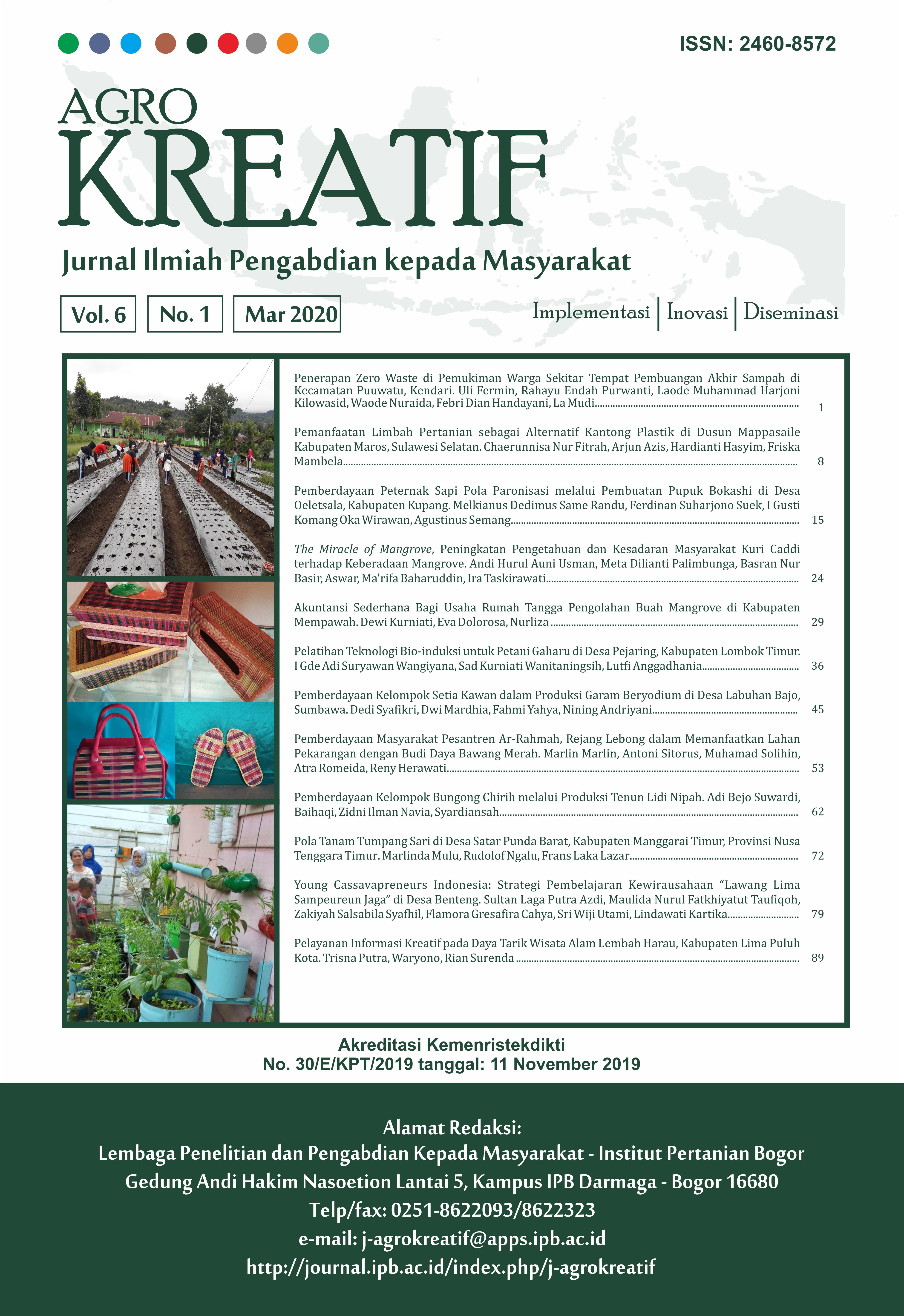Penerapan Zero Waste di Pemukiman Warga Sekitar Tempat Pembuangan Akhir Sampah di Kecamatan Puuwatu, Kendari
Abstract
Waste is a source of problems, if not managed properly it will cause environmental pollution, especially in residential settlements that live around landfills in Puuwatu District. The purpose of this community service activity is to reduce the pile of waste in the Puuwatu sub-district landfill through the application of the principle of zero waste, namely by processing organic solid waste into compost, leachate into a decomposer microorganism solution, and recycling inorganic waste for verticulture media. Activities undertaken to achieve the objectives of the Community Partnership Program (PKM) are through mass and group counseling to partners, training and plot demonstrations. Through these activities, partners who live around the landfill had been able to process organic solid waste, with the hope that the volume at the landfill will decrease, and the partner's income will increase. Partners who were actively involved in the activity had been able to produce compost (labeled Komsa-Mitra) that was ready to be commercialized, and are also able to process leachate as a source of decomposer microorganisms (labeled mollin) in the composting process. Partners around the Puuwatu landfill were also able to utilize waste plastic and rubber containers into a vegetable cultivation container with a verticulture system in the yard and the hervested vegetable was used to meet the family's nutritional needs.
Downloads
References
Affandi NA, Isnaini E, Yulianti CH. 2015. Peran Serta Masyarakat dalam Pengelolaan Sampah Komprehensif Menuju Zero Waste. Dalam: Seminar Nasional Sains dan Teknologi Terapan III. Surabaya (ID): Institut Teknologi Adhi Tama Surabay. Page: 803–814.
Ali M. 2011. Rembesan Air Lindi (Leachate) Dampak pada Tanaman Pangan dan Kesehatan. Surabaya (ID): Universitas Pembangunan Nasional Veteran.
Damsir, Suprihatin, Romli M, Yani M, Herlambang A. 2016. Karakteristik Lindi Hasil Fermentasi Anaerobik Sampah Kota dalam Lisimeter dan Potensi Pamanfaatannya Menjadi Pupuk Cair. Jurnal Teknologi Industri Pertanian. 26(2): 125–133.
Desiliyarni T, Astuti Y, Fauzy F, Endah J. 2003. Memanfaatkan Rumah dan Pekarangan Vertikultur Teknik Bertanam di Lahan Sempit. Jakarta (ID): Agromedia Pustaka. Page: 22.
Dimiati DD, Hadi W. 2017. Uji Pemanfaatan Pupuk Organik Cair Lindi dengan Penambahan Bakteri Starter Terhadap Pertumbuhan Tanaman Hortikultura (Solanum Melongena dan Capsicum Frutescens). Jurnal Teknik ITS. 6(2): 2337–3539. https://doi.org/10.12962/j23373539.v6i2.25199
Karlaitė D. 2013. Waste Management-The Future of Prosperous Socially Responsible Business. In Proceedings: 3rd International Scientific Conference “Practice and Research in Private and Public Sector. Page: 82–89.
Palupi NP. 2015. Ragam Larutan Mikroorganisme Lokal sebagai Dekomposer Rumput Gajah (Pennisetum purpureum). Jurnal Ziraa’ah. 4(2): 123–128.
Purnomo EN, Pangarsa KB, Andri, Saeri M. 2015. Efektivitas Metode Penyuluhan dalam Percepatan Transfer Teknologi Padi di Jawa Timur. Jurnal Inovasi dan Teknologi Pembelajaran. 1(2): 192–204.
Surjandari I, Hidayanto A, Supriatna A. 2009. Model Dinamis Pengelolaan Sampah untuk Mengurangi Beban Penumpukan. Jurnal Teknik Industri. 11(2): 134–147.
Syam A. 2003. Efektivitas Pupuk Organik dan Anorganik terhadap Produktivitas Padi di Lahan Sawah. Jurnal Agrivigor. 3 (2): 232–244.
Widawati E, Tanudjaja H, Iskandar I, Bidiono C. 2014. Kajian Potensi Pengolahan Sampah (Studi Kasus: Kampung Banjarsari). Jurnal Metris. 5(2014): 119–126. https://doi.org/10.20885/jstl.vol4.iss2.art4
Widiarti IW. 2012. Pengelolaan Sampah Berbasis “Zero Waste” Skala Rumah Tangga Secara Mandiri. Jurnal Sains dan Teknologi Lingkungan. 4(2): 101–103.
Widiyani S, Oktiawan W, Zaman. 2016. Pengaruh Penambahan Lindi dan Mol Tapai Terhadap Waktu Pengomposan. Jurnal Teknik Lingkungan. 5(4): 1–9.
Zonasultra. 2017. Selama Ramadhan Volume Sampah di Kendari Meningkat 20% per Hari. [Internet]. [diunduh 10 Agust 2018]. Tersedia pada: https://zonasultra.com/selama-ramadhan-volume-sampah-di-kendari-meningkat-20-persen-perhari.html
This work is licensed under a Creative Commons Attribution-NonCommercial 4.0 International License.



















